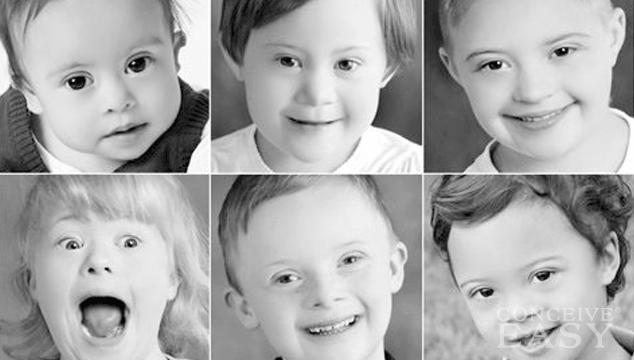
Down Syndrome is one of the most common birth defects that there is. In fact, Down Syndrome is the most commonly occurring genetic condition in the United States, and it affects around one in every 700 babies. However, there is an alarming connection between maternal age and the incidence of Down Syndrome. Claim Your 20 Free Pregnancy Tests – Click Here
While the average occurrence of Down Syndrome is one in every 700 babies, once a woman reaches 40 years of age, the chances of her having a baby with Down Syndrome is around one in every one hundred babies. As you can see, the chances of having a baby with this condition jumps very dramatically as a woman gets older.

Age and fertility go together. Doctors say that they don’t really know WHY the incidence of Down Syndrome increases so much with maternal age, but it is clear that the risk is greater depending on the mother’s age. Take this into consideration: at 25 years of age, the chance of a woman having a baby with Down Syndrome is 1 in 1200.
At 30 years of age, the chance is 1 in 900. At age 35, a mother has a 1 in 350 chance of having a baby with Down Syndrome.

Each cell of the human body contains 23 pairs of chromosomes. Half of these are from the mother and half are from the father. In people with Down Syndrome, most cases are caused by an extra copy of chromosome 21 in every one of the body’s cells.
People who have Down Syndrome often have distinct facial features, such as slanted eyes, a flattened facial appearance and nose, small ears, and short fingers with broad hands. Babies with Down Syndrome are usually born at an average birth weight but usually have shorter stature when they get older.

There are ultrasound tests and blood tests that can be done during pregnancy to find out if a woman is at risk of having a baby with Down Syndrome. If it is revealed that a woman is at risk for having a Down Syndrome baby, there are more invasive tests that can be done to know for sure.
These tests include an amniocentesis, CVS and PUBS. After birth, the main test for Down Syndrome will be based on the baby’s appearance. It is usually quite apparent from outward appearance whether or not a baby has Down Syndrome or not, but if for some reason a doctor is not sure, there are additional tests that can be done to look closer at the body’s chromosomes.

The truth of the matter is, no matter what the reason, there is a clear connection between maternal age and the frequency of Down Syndrome, so older mothers should make sure that they are well informed and prepared.










Comments